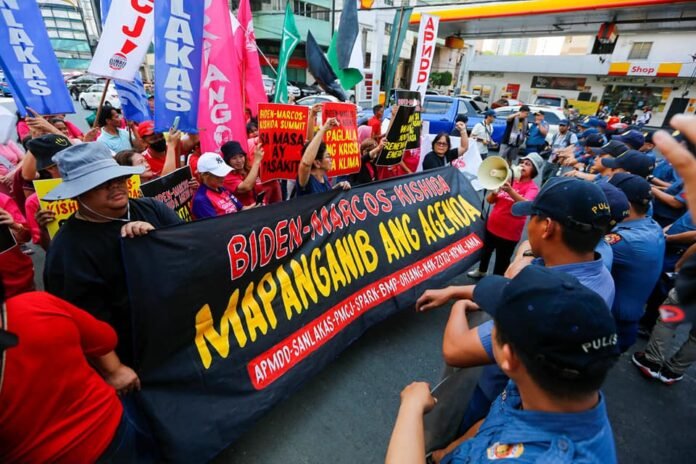MANILA-With the stage set for the trilateral meeting of US President Joe Biden, Japan Prime Minister Fumio Kishida, and Philippine President Ferdinand Marcos, Jr. in Washington D.C., civil society groups in the Philippines warned the three world leaders against entering into a “dangerous, unholy alliance” to extend the life of fossil fuels under the guise of cooperating on climate mitigation and promoting clean energy.
Civil society activists from Philippine-based climate groups pointed out that the US is the world’s top producer and supplier of Liquefied Natural Gas (LNG). Japan, on the other hand, is a top gas importer and the world’s second-largest provider of public finance for fossil fuel projects.
The Philippines has 25 operating gas power plants while many more are up for construction, including three LNG terminals in Luzon.
The depletion of the Malampaya gas field in Palawan means that the country will now import its gas supply and the burden will be passed on to consumers already suffering from poverty and recession.
Climate advocates staged a rally in front of the US embassy in Manila on April 11, calling on both the US and Japan to “Stop Dirty Energy Plans” in Asia, including the construction of more “planet-wrecking gas plants” as well as the promotion of false solutions to counter climate change.
Among these are fracking, ammonia co-firing, and CCUS (carbon capture, utilization, and storage).
The activists cautioned President Marcos against “entering into an unholy alliance” with Biden and Kishida at the Washington summit.
“He should not tread on dangerous waters and be a puppet for the grand plans of the US and Japan to champion their capitalist interests in fossil gas. The trilateral meeting gravely endangers the well-being and future of the peoples of Asia. We reject fossil gas and other false solutions to energy security included in their agenda as these will only exacerbate the climate crisis. We are not the dumping ground of excess LNG (liquefied natural gas) surplus from the Global North. We demand a rapid and just transition out of fossil fuels into 100% renewable energy systems,” stressed Lidy Nacpil, coordinator of the regional alliance Asian Peoples’ Movement on Debt and Development (APMDD).
“Historically the US and Japan have been the biggest climate crisis perpetrators and laggards in climate action. Despite committing to end fossil financing they are still investing in huge gas projects and false solutions. We do not want any US or Japanese-funded fossil gas projects in Asia!,” noted Luke Espiritu, National President of the Bukluran ng Manggagawang Pilipino.
“Rapid, just, and equitable renewable energy transition should be the focus of Biden, Kishida, and Marcos, not lining their pockets with profits from environmentally- and socially destructive fossil fuel investments, and certainly not the militarization of the Asia-Pacific!” added Patricia Racca, Secretary-General of the Samahan ng Progresibong Kabataan.
Aside from the Asian Peoples’ Movement on Debt and Development, Philippine Movement for Climate Justice, Sanlakas and Oriang, the other groups who joined the pro-climate mobilization were Bukluran ng Manggagawang Pilipino (BMP), K4K Quezon City, SPARK – Samahan ng Progresibong Kabataan, Zone One Tondo Organization (ZOTO), Kongreso ng Pagkakaisa ng Maralita ng Lungsod (KPML), and Aniban ng Manggagawa sa Agrikultura (AMA).
A report released by the Global Energy Monitor last March said the US, as the world’s fossil fuel superpower, is on track to “nearly quadruple the amount of extracted oil and gas from newly approved projects by the end of this decade” – in violation of agreed-upon climate targets to limit the global temperature to 1.5C. Japan, on the other hand, has been identified as one of the Top Three of the world’s top fossil fuel financiers, supporting $6.9 billion worth of projects between 2020 and 2022.
This is according to the latest report published by Oil Change International and Friends of the Earth US entitled “Public Enemies: Assessing MDB and G20 International Finance Institutions’ Energy Finance.” (APMDD)
Photo by Jimmy A. Domingo




